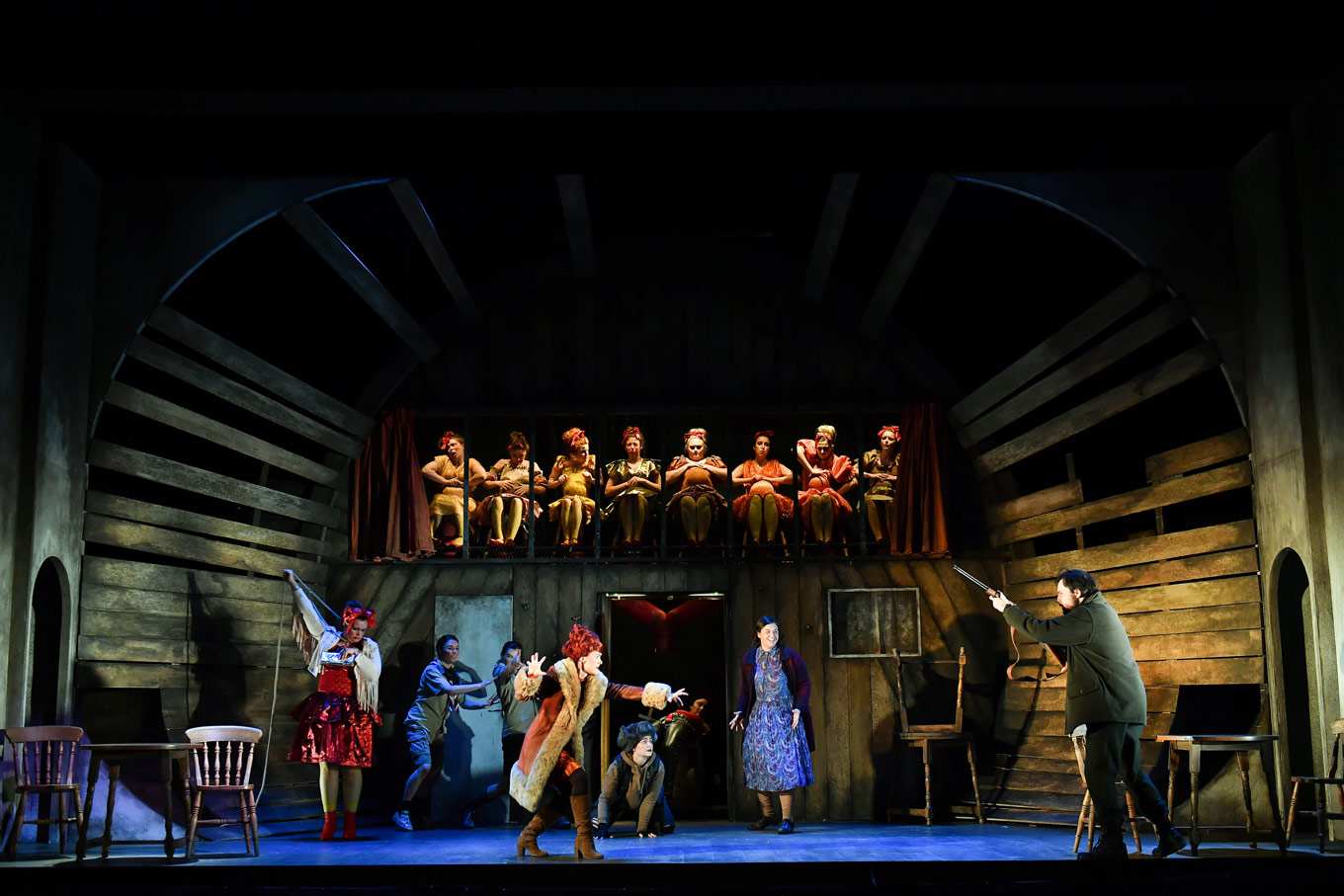
Reflective stories: RCM's The Cunning Little Vixen
ReviewThe Cunning Little Vixen is an opera of complexity and ambiguity, evading simple characterisations. This gives it an appeal to cynical modern audiences that Don Giovanni or La Traviata could never hope to match. The Royal College of Music’s production took full advantage of these nuances to allude to contemporary social issues.

One of the paramount themes of this production is oppression. At the beginning of the opera this seems straightforward enough. A Forester (Harry Thatcher) abducts a young vixen in the forest, taking her home as a pet. After attacking his children she is tied up in the yard. There the Dog advises her to behave well and please their master. Uttering her plaintive wail leitmotif, we pity the poor creature, confined and imprisoned. Seeing one of the Hens acting subservient to the lecherous Rooster, she attempts in vain to stir up a poultry revolution.
At this point you might imagine the Vixen (Harriet Eyley) becoming a revolutionary in true Soviet Propaganda style, leading her fellow animals in revolt. But then something genuinely unexpected happens. The Vixen, having killed the rooster, then kills the Hens and escapes into the forest. Discovering a badger’s lair, the resident Badger is forcibly evicted to make room for her. Hence the oppressed has become the oppressor.

There are countless examples of this throughout history, as well as some contentious contemporary situations which I will avoid mentioning. Even the scenery reinforces it, the stage contained within a giant wooden barrel, whose concave walls press down on the figures between them. But towards the top the sides disintegrate, suggesting the possibility of escape and hope. The Vixen reminds us of the responsibilities which accompany freedom: if you abuse your position then you become the oppressor, no better than those who had crushed you before.
There are references made to contemporary social concerns. When The Forester first picks up The Vixen, she cries “mother, mother”. And as he walks off with singer Rosalind Dobson slung over his shoulder it’s impossible to ignore the allusion to abduction and child sexual abuse. Similarly, when The Vixen is tied up in the yard, deprived of her freedom, the scenario brings to mind the horrifying Fritzl case a decade ago. The production also alludes to current concerns over animal rights. The exploitation of the farm’s Hens is reminiscent of Orwell’s Animal Farm. Happily clucking above the stage, we see their eggs accumulating underneath, a reminder that these animals exist merely to satisfy human consumption. And in the final act The Vixen is shot dead by the hunter Harašta. By this point The Vixen is a wife and mother, a poignant reminder of the loss which accompanies the deaths of animals. It’s not just humans who lose loved ones.

The emotional life of The Forester is also explored. He becomes obsessed with The Vixen, desperately hunting her following her escape and fantasising about her. Playing their imaginary selves, dancers Azzurra Caccetta and Francesco Mangiacasale present us with The Foresters sensuous fantasies. We peer into his possessive love, understanding that his brutal treatment of The Vixen isn’t due to malice but infatuation. Not that this prevents him laying traps for her or pursuing her with a shotgun. He doesn’t love her as an individual but as an object. His passion is a dangerous one, and a warning of the hazards which accompany a love not based on mutual respect. Love might be one of society’s more idealised sentiments but that doesn’t mean it’s always healthy.

The Cunning Little Vixen starts out with a simple scenario. A poor young vixen is abducted by a brutish forester. But as the opera progresses we realise that these two dimensional characters are really far more. Though The Vixen might start as a victim that doesn’t prevent her abusing others later. And though The Forester might stomp around mistreating wildlife we are shown a more tender, though problematic, side to him. Janáček had a keen perception of human complexity, of the myriad impulses and emotions which either drive us on or tear us apart.
This is what makes The Cunning Little Vixen such a remarkable opera: in watching its complicated and confused characters, ironically half of whom are animals, we see so much of ourselves. Understanding these intricacies and subtleties, the RCM created a production which explored the contradictions and pretenses that comprise being human.



Comments